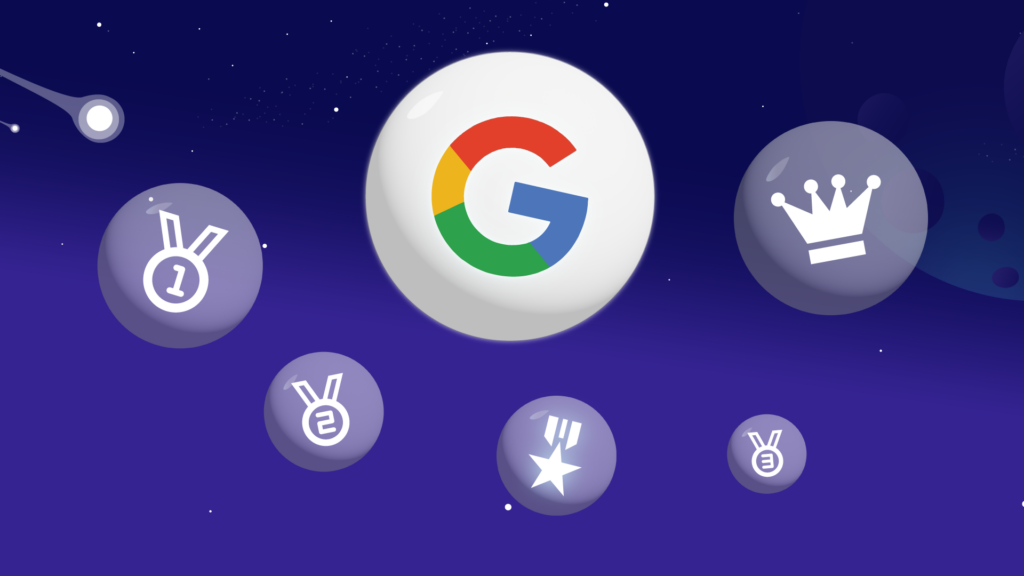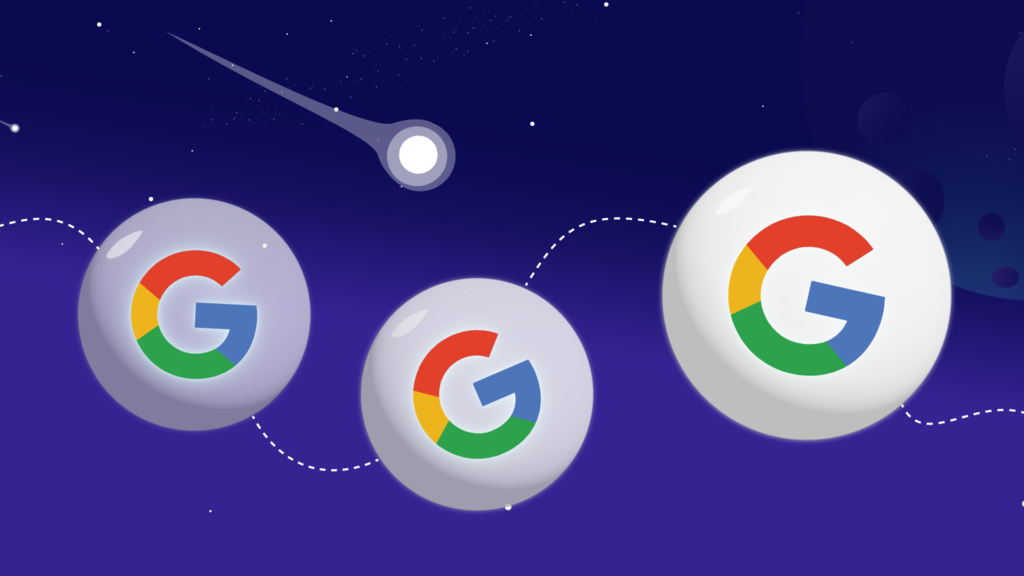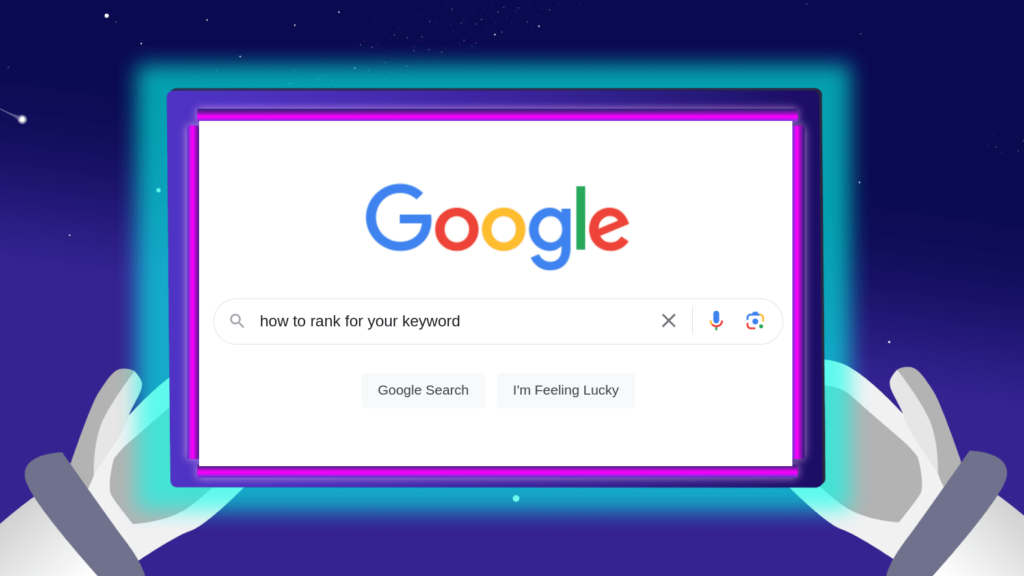How Does Google Rank Search Results?
To rank websites, Google uses web crawlers that scan and index pages. Every page gets rated according to Google’s opinion of its authority and usefulness to the end user. Then, using an algorithm with over 210 known factors, Google orders them on a search result page.
Therefore, appearing higher in the search result pages for a given search query directly means you’re the most relevant and authoritative result for it according to Google.
These search result pages answer specific search queries which are made up of keywords and phrases. Google’s AI is also able to understand the meaning behind each query – and therefore processes them in concepts rather than just individual words. This algorithm works similarly to the way we humans understand and process language – and is therefore called Natural Language Processing (NLP).
But to say that’s the end of the story is unfair. As we established, there are over 210 known factors that influence your rankings.
Now, we know and understand many of those factors that determine your ranking positions in Google. However, some of them are still a mystery. This is because some of the ranking factors are also created and adjusted by Google’s Artificial Intelligence algorithms itself.
Understanding how Google thinks might seem like an impossible task. But worry not, as there are some clear and certain things you can do to improve your search rankings.
First, try to check your website rankings in Google. You can do it for free below:
Google does many things to support webmasters and guide them in ranking higher. One of those things is, for example, the regular talks with their representative John Mueller who often explains concepts on how to understand the algorithm and rank higher. In fact, Google goes as far as running a blog where they share news on the latest algorithmic updates.
Does Google Ever Change How It Ranks Websites?
Yes, Google regularly changes how it ranks websites. These are called algorithmic updates and occur daily. Most of the time, they are minor updates but sometimes Google releases a bigger update to the algorithm.

Larry Page & Sergey Brin developed Google and its ranking algorithm all the way back in 1996. However, throughout the years the algorithm has evolved and is constantly including new factors. In fact, Google has stated publicly that their algorithm gets continuous updates several times every single day.
Overall, these are minor changes that improve the search results and tailor the right pages to specific queries. We’ve researched exactly how many times Google changes how they rank websites per day is, so keep reading.
But every once in a while – usually every 3-6 months, Google also releases a bigger update. These are known as “Broad Core Algorithm Updates” and normally affect millions of websites at a time. To simplify things we can say that these major updates happen when Google “becomes considerably smarter” and is therefore able to show better search results.
How Often Does Google Change How They Rank Websites?
Google changes how they rank websites regularly. The minor changes happen daily and about every quarter we get a larger algorithmic update. We can’t predict the changes but based on historical data, we can guess when an update is expected.

Both the minor and bigger changes affect which websites appear at what positions in Google’s search result pages. However, the bigger updates usually change rankings more drastically and last for longer. If you happen to lose your rankings throughout a Google update, the SEO process afterward usually consists of recovering them. Such drastic drops generally do not affect websites that are well maintained, but technically no one is safe. Here’s a good post to learn more about recovering rankings. And naturally, as the internet becomes more common and Google expands even further, there are more regular updates.
Minor Algorithm Updates
The algorithm gets somewhere between 5 to 9 minor updates every day. The more advanced the algorithm gets, the more frequent the updates. Based on how frequent the updates are, the number of position changes throughout the day and how big the fluctuations are, we can estimate how big and volatile the algorithmic updates are. Ten years ago, those changes would happen about once a day. In 2018, however, there were over 3200 changes – which averages out to about 9 updates a day.
Broad Core Algorithm Updates
They roll out bigger algorithm updates around every three to four months. That usually ends up being about four to five times a year. Their very large updates usually have unique names (e.g. “Panda”, “Penguin”, “RankBrain”, “Medic”, “BERT”, etc.). However, some of the other updates have a generic name where the date is included (e.g. “June 2019 Core Update”, “May 2020 Core Update”, etc.)
How Does Google Decide To Update The Ranking Algorithm?
To decide when to update the ranking algorithm, Google primarily relies on both webmaster signals and user signals. Google closely monitors both what webmasters do with their pages and how users react to that content.
That is, Google’s main purpose is to always provide as much value to the user – and therefore protect it from bad pages and content in the search results. If it notices that a webmaster is trying to game the algorithm and get an advantage, or if it sees a certain type of user behavior pointing towards dissatisfaction with the results, Google is going to take action about it.
Such an update, for example, was the recent “Reviews Rich Snippets Schema Update”. In short, it targeted businesses that were using biased and sometimes even untruthful reviews and review stars in Google to attract more customers. In it, Google specifically pointed out that the reason they enforced those changes was the fact that many businesses were using self-serving tactics to gain an advantage and rank higher.
Now, it is important to also say that there have also been a few updates orchestrated solely by Google – but their end goal has always been to serve the users better and less biased content. Such is, for example, the somewhat recent “YMYL” update. The update called “Your-Money-Or-Your-Life” set strict guidelines on who and how can rank for content that is potentially dangerous for the users (e.g. health, happiness, loans, etc.)
In short, when a certain behavior gets exploited to gain an advantage in the search results, Google is sooner or later going to catch up and penalize it.
Now it’s time for us to look at which ranking factors Google monitors closely to determine what to change.
What Factors Does Google Consider When Ranking Websites?
In short, the main factors that decide website rankings in the search result pages are how useful your content is, how well-rounded your website is from a technical standpoint, and how authoritative your website is based on links from other websites.
First, let’s explore a little more of the individual factors that decide website rankings. After that, we’ll look at what makes a page bad and how that impacts your search engine rankings. Those are:
On-Page Content
Firstly, let’s establish that by “On-Page Content” we include the overall appearance of your pages – and not just e.g. the text featured in the main body of a page or a blog post. With that, there are several measurements that Google takes into consideration when analyzing your website content. The most important ones are:
- How unique your content is
Based on analyzing other websites in your industry. Have you used someone’s content or is it original? Are you adding anything new to the subject or are you recycling what others have written about?
- How helpful your content is
Based on user signals. Do users stay reading for a while? Or do they quickly bounce back to the result page? Do they scroll down and engage with your content? Do they click and explore other pages? Do they click on your internal links and explore other pages? Or do you have broken links that lead them nowhere? Is your content genuinely helpful or are you just keyword stuffing?
- How in-depth your content is
Based on content length and topical relevance. Probably also measured by Google’s NLP algorithms. Writing extensively also increases your chances of featuring more related words which can be a good ranking signal.
- How attractive your page is to the end user
Simply said, do you “present” your page well in the Search Engine Results Page? Is your Title Tag well optimized? Is your Meta Description relevant? Does your brand & website name show relevancy? And do they together make the user click on your page when they search (also known as Click Through Rate; CTR)?
Off-Page Factors
Up until now we looked at factors you directly control on your website. With off-page factors, however, we’re looking at what happens on other websites. More specifically, Google looks at:
- How authoritative your website is in general
How many websites link to you? Are they authoritative themselves? Are they also relevant to your topic and industry?
- How authoritative your specific page is
Similar thinking as the point above. Do you have any inbound links pointing to that specific page? Are your pages linked from relevant websites in a contextual way with clear and descriptive anchor texts?
- How authoritative your competitors’ websites are
How many other websites link to them, how strong those linking websites are, and are the links relevant or spammy?
- How relevant your competitors’ websites are compared to the search
If a website writes on the topic of pets, an article about “cars” won’t do well (unless it’s related to pets, of course).
All of these factors (and more) signal to Google how worthy and deserving your website is of ranking in the search results.
What Are Bad Pages According To Google’s Algorithm?
“Bad pages”, pages that are not optimized for Google’s algorithm, can generally be explained as such:
- Pages that have a high bounce rate.
Imagine this – A user is using Google Search with your target keyword. They see your web page on the Google Search Results Page and click on it. Shortly after, they either leave your web page or return back to the search. This type of interaction is counted as a “bounce” and increases your bounce rate. In this case, an increase in bounce rate is bad – and to Google, it means more people are leaving your site unsatisfied. And a high bounce rate will negatively impact your Google rankings.
There are many reasons why your bounce rate could be high or increasing. However, the biggest reasons are often related to your page’s content.
- Pages that are slow to load
The idea is this: If you have a low page speed, the user might think the page is broken. In the age where everything is instantly at our fingertips, having a page speed above 3 seconds can impact how Google’s algorithm scores your page. This is especially true for mobile users who are also searching on slower devices. Keep also in mind that a mobile user is browsing from a more throttled network, meaning that page speed can really become an issue if your page’s content is large. This could be, for example, large web assets like scripts, images, and videos.
All of these factors could slow them down when trying to get to the relevant content – and therefore they might not even engage with your page. And in turn, this might tell Google that you’re not one of the relevant results for this target keyword. Because of this, you want your mobile version to be well-optimized, even if the desktop version of your site isn’t at optimal performance.
Fortunately, Google provides you with many tools to help you determine whether you are following their recommended best practices. Although Google primarily makes its money from Google Ads, they are still focused on helping both large and small businesses achieve higher rankings in organic search. They do that, for example, through tools like PageSpeed Insights, Google Analytics, and Google Search Console. I recommend that you use all of them, but especially tools like Search Console because it is directly tied to how Google sees your website and the errors it finds on it.
Since you now understand the factors that come into play, let’s look at some concrete actions you can take (even today) to improve your search rankings.
Which Ranking Factors Can You Improve To Appear Higher In The Search Results?
This guide was made to explain how Google rank websites and does not serve as an action guide for how you get on top. But don’t worry, we got a guide for that too 👍️
The actionable guide is found here: simple step-by-step guide on how to get a keyword to rank

Remember, Google Is Constantly Playing The Cat-And-Mouse Game
And there you have it! We looked at how Google determines the rankings in search result pages and the most important factors it considers. With that, we also explored how you can influence those factors to help your website rank higher when your customers are searching for businesses like yours.
Meanwhile, remember to make sure you’re doing everything in accordance with Google’s guidelines. It is probably accurate to say that Google is always playing a “catch me if you can” type of game with website owners. Because appearing higher in Google can potentially bring in millions of revenue, it is in webmasters’ interest to try and get an advantage.
Over the years, search engine optimization professionals have come up with countless tactics to try and trick Google into showing their website higher in the results. But fortunately, Google is actively fighting that and is trying to stay as neutral as possible – and thus creating a better user experience for us, the end-users.

